Ida Nielsen: “When I do my own band, I can feel so many things that I learned from Prince. He was a great bass player”
The bassist talks tone, signature gear and Prince's love of Danelectro Fab Tones
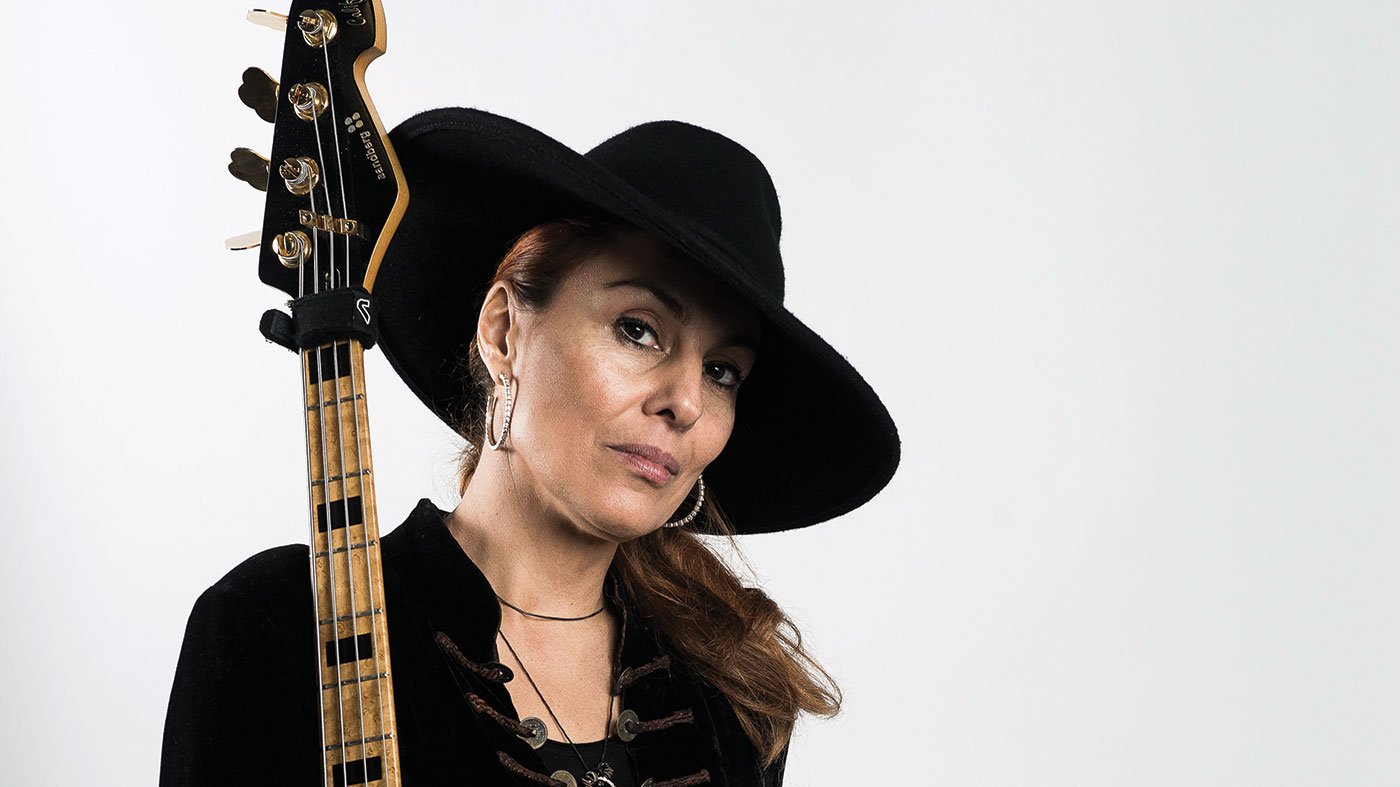
Danish bassist, singer, songwriter and bandleader Ida Nielsen is a force of nature, whether as a solo performer or with the late genius Prince, with whom she played for six years. Want to know how it feels to plug in and play at Paisley Park? Read on...
When Ida Nielsen picked up the phone in 2010 to hear Prince’s manager asking if she’d like to come and audition, a career began that included six years alongside the great man, playing bass in two of his bands - the New Power Generation and 3rd Eye Girl. Prince always knew his stuff when it came to picking phenomenal musicians, with Ida sadly one of the last in a prestigious line of bassists going as far back as Andre Cymone and Brown Mark.
Prince died at the age of 58 in April 2016, 20 years before his time and with his life’s work far from complete; his last few years showed that he had plenty of creative capital in the bank. Nielsen fuelled his final works with immaculate bass playing, and her performances over those years of touring the world, plus the slick funk she contributed to 3rd Eye Girl’s 2014 album Plectrumelectrum, marked her as one of the finest bassists of her generation.
Before she got that call, Nielsen was already a supremely accomplished bassist and solo artist, with a recording and touring career underway. We interviewed Nielsen previously when she talked at length about her background as a musician; this time, we’re looking at her experiences with Prince, her ongoing solo career and her amazing bass gear.
There’s a lot to discuss; with a fourth album underway and a summer of tour dates ahead, she’s a musician with tons on her plate. Read and learn, folks.
What are you up to at the moment, Ida?
I decided to form a band with a lot of bass in it, I wanted it to be a playground for me
“My next album is practically done, I just need to put finishing touches on it. Right now I’m touring a lot, so it’ll have to wait until then. I love creating new music but I also love to play with my band. In a normal band you have to respect the music, of course, but I deliberately set this one up so I could get to play a lot of bass, ha ha!”
Want all the hottest music and gear news, reviews, deals, features and more, direct to your inbox? Sign up here.
What’s the line-up?
“In Denmark, the line-up is me, drums, keyboards, a DJ, a rapper and a guitarist, with everybody singing, so it’s six people on stage, although my dream is to expand it and have a really big band with horns and percussion, but that will have to wait a while. When we travel abroad, it’s just a quartet - bass, drums, guitar and rapper.”
What are your objectives with the band?
“When I decided to form a band with a lot of bass in it, I wanted it to be a playground for me, but at the same time I wanted it to appeal to people who don’t love bass as much as bass players do. That means writing real songs, although of course there are grooves too. Sometimes I don’t even play, to create a little balance - and then when I do play, I go for it even more than usual. I love the fact that there is an audience for funk music.”
Do you play other instruments too?
“Live, I play some keys as well as bass. I can play drums as well, although my drummer in the band has that covered. On the album I play guitar too. Actually, Prince taught me how to play, so I’ve got rhythm guitar down pretty well, but I can only really play funk, so if I need a guitar solo I call a friend.”
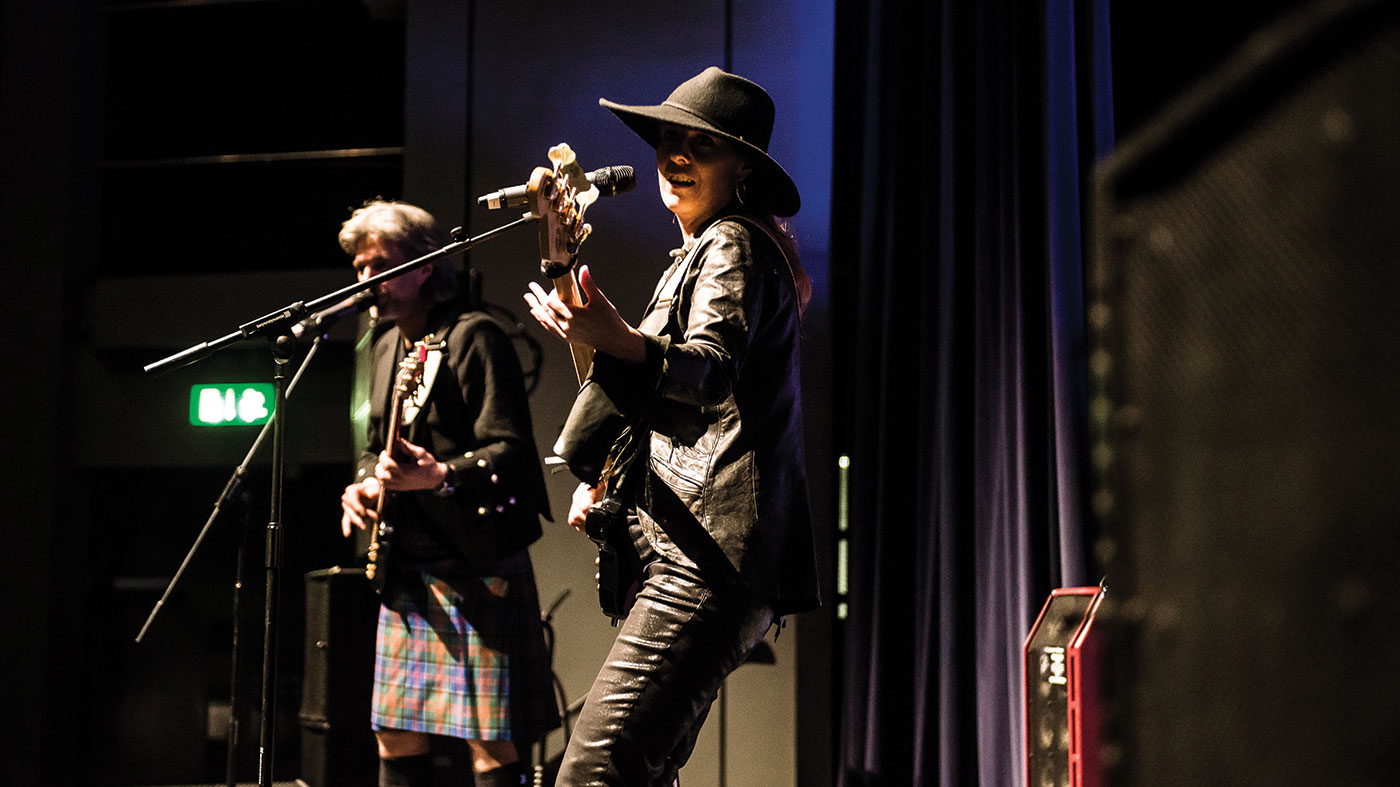
Sound of the Sandberg
That signature Sandberg California bass of yours is gorgeous.
“Isn’t it beautiful? I tried my first Sandberg at the Musikmesse in Frankfurt in 2009, and I said ‘I need this bass!’ Holger Stonjek from Sandberg said ‘I think you need it too!’ and we exchanged contact details. But he’d already sold that particular bass, so he sent me a different one; unfortunately, it didn’t sound the same. I felt terrible, but I had to say ‘I’m really sorry, Holger, but this bass doesn’t sound like the one I tried at Frankfurt!’”
How was it different?
“The tone wasn’t the same, even though the pickups were identical. Every bass sounds different, anyway. The one I tried was a Hardcore Aged Masterpiece, and those basses get a hundred hours on a vibration machine. It just didn’t sound the same, but Holger was really sweet about it; he’d sold that bass to a music store in Vienna, but he got it back from them and gifted it to me. That was so cool, man; he did that just because he wanted me to have it. This was before I started playing with Prince, too, so Holger wasn’t doing it for profit; he’s just a good-hearted guy.”
My Sandberg bass can sound like all my favourite sounds
How did the signature version come about?
“In 2016, during a break with 3rd Eye Girl, I went to Sandberg’s workshop for three days and we put together my signature bass, trying out different pickups and pickup positions. I had a really nerdy time there, it was fun! What was interesting was that you can find a position for one pickup that sounds really fantastic, but if you add another one and blend the two, it sounds horrible. I ended up with a bass that is very close to standard, but it was a cool journey to take.”
What’s the spec?
“The front pickup is a Jazz-style unit, which is different to my previous Sandberg’s Precision-type pickup because I wanted a different sound. That colours the sound a lot when you blend it in. Then there’s a Music Man-style pickup in the back, and you know how they sound. You can get a real tight sound from it, because it’s further back than it would be on a Music Man. So this bass can sound like all my favourite sounds; you can have a 70s sound if you play just the front pickup, and then you can switch to the back and it’s more Jaco-like. And the combination of the two gives you a really nice, warm, all-round sound. When I play, I add a little bit more of the front one so that it sounds a little more vintage.”
Does it give you all the tones you need?
“I feel that you can’t have everything in one instrument, but at the time I wanted a bass that sounded good for Prince and 3rd Eye Girl, which was mainly rock and funk. It sounds perfect for that, and also for my own stuff, but if you’re a fusion player, for example, you might go for another type of bass. It’s a matter of taste, of course, but I love the way my bass can sound really old or really modern.”
The fabric under the scratchplate is beautiful.
“I wanted it to be black and gold, so it looked like a rock-star bass. I said that to Holger and he said ‘You have to see this!’ and showed me this cloth, which is in between two acrylic plates. When I do double pops with my fingers, it really helps, because I have little fingers and they don’t get stuck beneath the strings because it’s thicker than a normal pickguard. That was a bonus that I didn’t expect.”
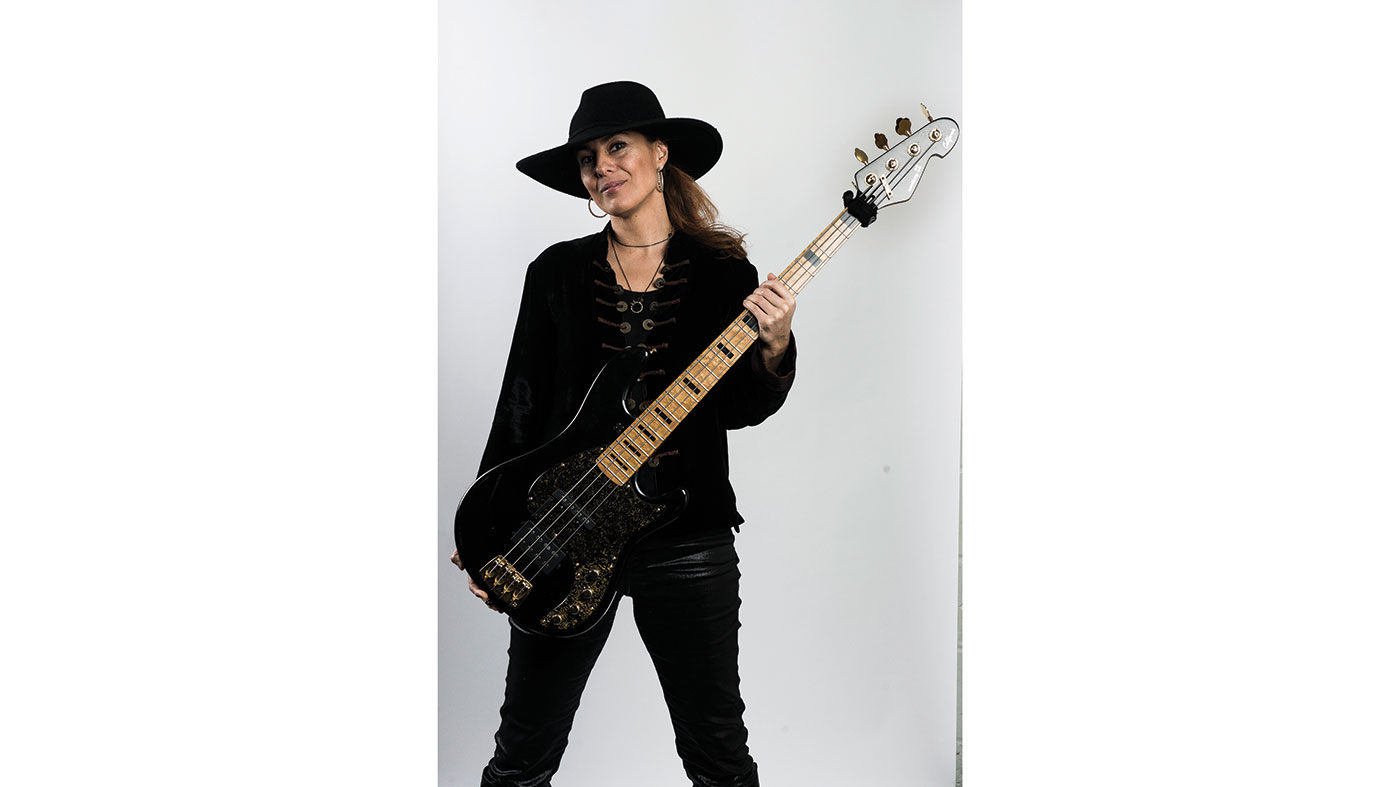
Rigs on the road
How many basses do you take out on the road?
“I only take one. We’re in the middle of doing a five-string version, though, and when that’s ready I’ll take that out on the road too. If we drive around Europe, I’ll take two basses, but on fly dates I’ll take one and hope for the best!”
What amps do you use?
“I’m with Eich; I have 2x12 cabs and their T-1000 head. I was very happy with TC Electronic for almost nine years, but sometimes you need to make a switch and move on.”
What effects do you take out?
I have a few of the old Fab Tones from Danelectro, because they were the ones that Prince preferred
“It’s a long story! Okay, my full pedalboard, which I’m not bringing out this time because it’s too big, has a mini Dunlop Crybaby bass wah, an old green DOD envelope filter, which they don’t make any more - I love how it reacts so fast when I do a solo - and then a Sub ’N’ Up octaver from TC Electronic, which can go up and down, or blend the two octaves if you like, to add more frequencies in a solo and make your notes sing more.
“Then I bring a fuzz pedal; I have a few of the old Fab Tones from Danelectro, because they were the ones that Prince preferred. They don’t make them any more, and they’re not super-stable - they’ll move around if you hit them too hard with your foot!
“I tried all kinds of fuzz pedals with Prince, but every time I tried a new one he was always like, ‘What is that? Where’s your Fab Tone?’ ha ha! I tried one from Darkglass, too, which I thought sounded great, although I don’t have it in my board, and there’s a TC PolyTune tuner as well.
“I tried a compressor recently called a Golden Ratio from Crazy Tube Circuits; it’s very good. I mostly use it when I solo, to boost my signal. I don’t use it when I’m just playing, because I like to feel the dynamics of my bass. The pedal also gives the tone a kick, which is cool for slapping and means I don’t need a booster pedal. I use delay and reverb as well, just for playing around, but I don’t carry them around in the board because I don’t use them with my band.”
Very cool. Which strings do you prefer?
“I play DR Pure Blue Strings, which are really bendy; they seem a lot thinner than they are, for some reason, which is good because I bend a lot and they make that easy for me. Last year a Norwegian composer called Rolf Wallin wrote a classical piece for bass for me, and I had to play some really, really crazy stuff at the South Bank with the London Sinfonietta. I appreciated the Pure Blue strings on that gig.”
Prince power
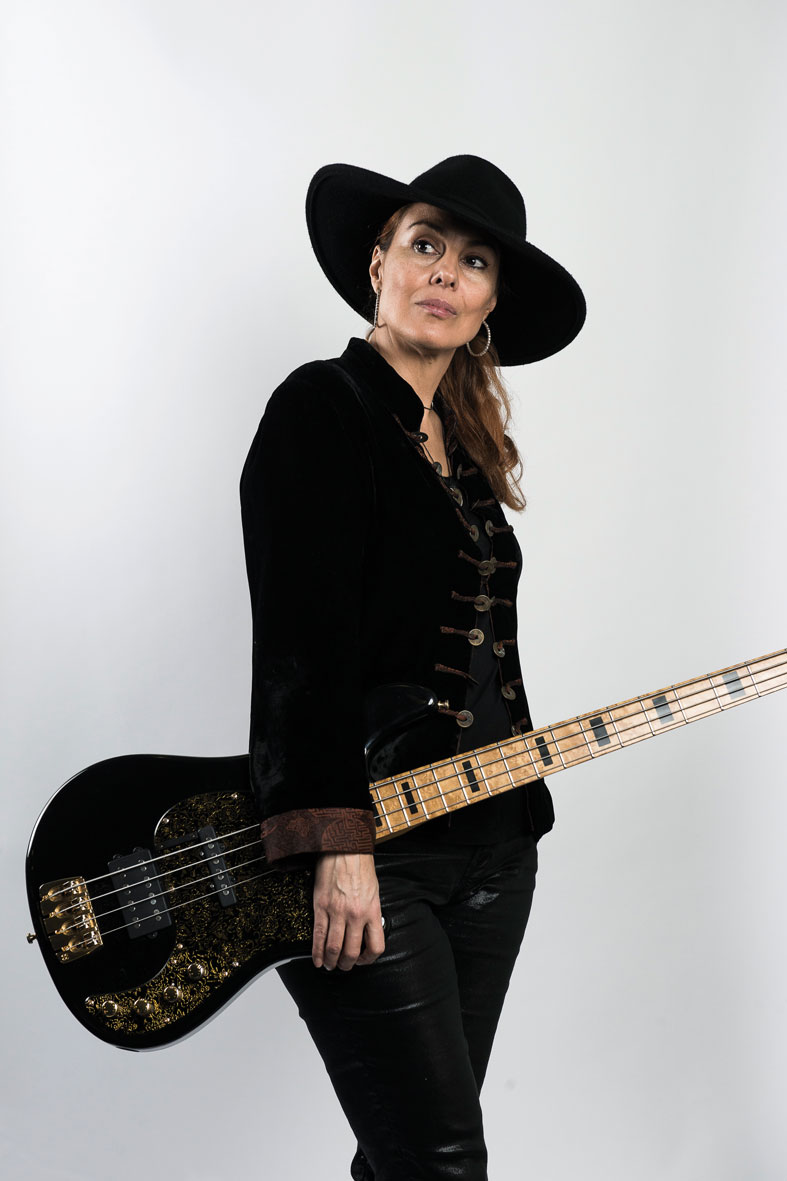
Classical music for bass sounds a bit tricky.
“It really was. There were no drums, and I had to follow the conductor, which made me pretty stressed, haha! I had to read a lot of music and there was a lot of stuff to learn, so it was hard, and there was a lot of pressure because you couldn’t hear a rhythm in any of the music. It wasn’t on the downstroke, it was in between them and somewhere on the way up again, so I just played it as best as I could. Rolf had me slapping some crazy stuff.
“I’m really happy I did it, though, because it was a step into a completely different world. The skills that those musicians have is incredible, and it’s a huge honour to have someone write a classical piece for you. We did it twice, once in London and once in Norway.”
When I do my own band now, I can feel so many things inside me that I learned from Prince. He was a great bass player, too
Do you do sessions too?
“I do a few sessions for friends when I have the time, but right now I’m busy doing my own thing. You know, I played with Prince for such a long time that it’s a little hard to imagine playing for someone else, because for me he was the biggest artist of all. At some point I’ll get over that, but at the moment I feel that doing my own stuff is the best way to stay in music.”
So let’s talk about Prince. How long were you with him?
“Almost six years, from 2010 until the last gig I did with him, which was New Year’s Eve, 2015; that was the last time I saw him. I played with the NPG from 2010 to 2012, and then he formed a big band in 2012. I played a bit of guitar in that band while Andrew Gouché was on bass, and then we started 3rd Eye Girl, which was completely different, because we played rock.”
How do you look back on your time in his band?
“I’m extremely grateful. I feel like I learned so much on so many levels. When I do my own band now, I can feel so many things inside me that I learned from him. He was a great bass player, too, and the musicianship, arrangements and recording was really next-level.
“The first time I was in the studio with the NPG, I was surprised because we weren’t using a click. I said ‘Aren’t we using a click?’ and the drummer, John Blackwell [who died in 2017 - Ed], said ‘No, we lock to ourselves.’ I know on some of Prince’s records there are some drum machines, but most of it is not played to a click - it just sounds like it is because it’s so tight.
“It was mind-blowing to me to see him work in the studio and arranging things; I learned so much, it was such a gift. Of course, I enjoyed all the flashy superstar stuff, and I’m glad I saw those things, but it’s really the musician that he made me into, just by being there and observing, that I’m most grateful for.”
Ghosted
You said earlier that Prince taught you to play rhythm guitar. Was it literally from scratch?
“I knew three funk chords and that was it, but I had a good rhythm and he saw that. He was great at seeing stuff in people before they discovered those things themselves.”
Was he directive with your bass parts, or did he give you free rein to do what you wanted?
Prince didn’t like ghost notes, so I had to relearn to play lines without putting in all that stuff
“Both. Some of the stuff had to be quite specific, because he could play everything himself and he wanted to make it sound the way it would if he played it.”
So how did he like it to sound?
“He didn’t like ghost notes, so I had to relearn to play lines without putting in all that stuff. But sometimes he would give me a free hand, although if you have a line, you have to play that line. You could play a little around it, and if it was cool it was cool, but if you did something that wasn’t cool, he’d go, ‘You should stick to the part!’”
Surely ghost notes are the essence of funk?
“Yes and no. In the old Minneapolis style of funk, there are a lot of very straight drum beats; the funk is mainly in the rhythm of the guitar parts. What I learned, and I apply this in my band now, is that you can’t have everybody being busy or it won’t be tight any more - it’ll just be one big soup with a lot of notes.
“Prince’s stuff is so tight and energetic because there’s space there; the keyboard or the guitar might be busy, but no-one else will be busy at the same time. Everybody has little tight parts, and it’s so funky. In my band, for instance, the bass is busy, but the other people can’t be busy at the same time, haha! That’s the rule…”
Did you have a solo spot in the live show?
“Yes; we did the revamped version of Let’s Go Crazy; have you ever heard it? It was downtempo, with a really heavy beat, and I had a fuzz solo. We all had a little place in each show to play a few bars of our own stuff.”
Sounds like a great opportunity. What did you play at that point?
“That depended on the song and the mood. Mostly I would slap if I could get away with it, haha!”
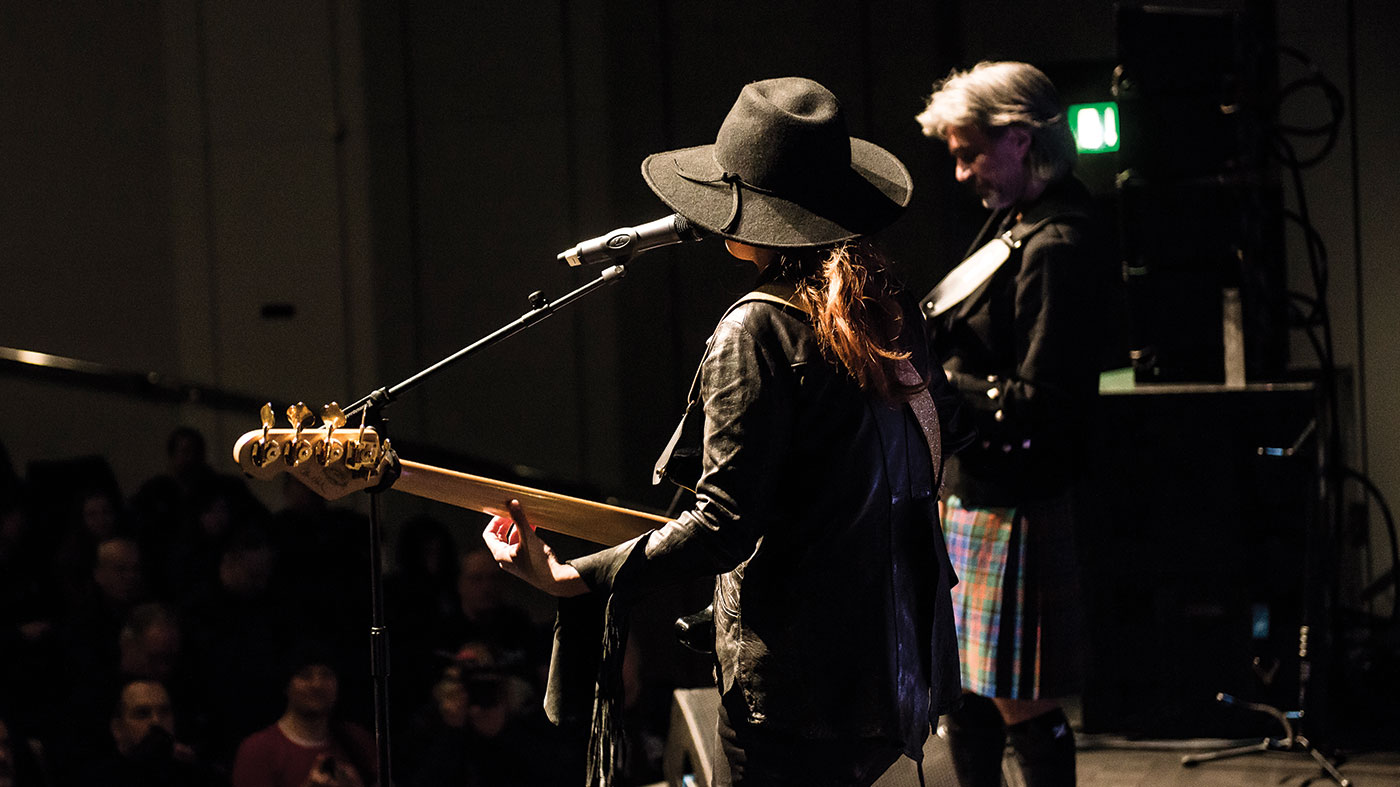
Jamalot
Did you jam a lot with Prince?
“Yes, a lot - we jammed all the time, almost every day. We did a lot of recordings, and some of it went on the CD and some did not. We definitely did some very cool stuff that didn’t make it to the album. I guess it’s in the vault now.”
What do you recall of the recording of Plectrumelectrum?
We were on a break and he was doing the solo tour, but there was lots of material ready for us to pick up again afterwards
“We actually didn’t know we were recording an album, because he didn’t tell us. He taught us the songs and we recorded them, but we thought we were keeping them for reference, because we taped everything we did. The album was recorded in one room, so we couldn’t do redos because there would be bleed in the drum mics, so we really didn’t think we were doing an album.”
Would you have recorded another album with him?
“I’m sure we would have, at some point. We were on a break and he was doing the solo tour, but there was lots of material ready for us to pick up again afterwards.”
So here we are in 2018. How long have you been a full-time musician?
“A decade or so. Before I got the call from Prince in 2010, I was a musician but not full-time, because I was also teaching. A year before that, I made the decision to record an album and form my own band, and really crack down on everything so I could just focus on making music rather than doing a lot of other stuff. If you’re teaching, you’re giving a lot every day, and when the day is over you can be burned out. You don’t feel like going home and creating music, so I made my decision in 2008 or ‘09, recorded my first album and cut down on everything else. I’ve stuck to that, and now I’m ready for the next step.”
Thanks for the interview, Ida. Any words of advice for the bass community?
“Well, I’m super grateful that I’ve been able to enjoy a career as a musician. Of course, making it happen is about having skill on your instrument, but it’s also about luck - being in the right spot and being heard by the right person. You have to be willing to make some sacrifices, but it’s definitely been worth it.”

